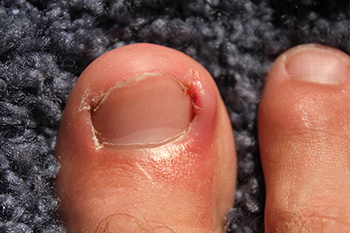 Ingrown toenails occur when the edge of a toenail grows into the surrounding skin, causing pain, redness, swelling, and sometimes infection. This condition most commonly affects the big toe. Ingrown toenails can result from improper nail trimming, wearing tight or narrow shoes, injury to the toe, or genetic factors that cause nails to curve naturally. If you experience severe pain, significant swelling, pus, or signs of infection, or if mild treatments, such as soaking the foot and wearing comfortable shoes, do not alleviate the symptoms, it is suggested that you schedule an appointment with a podiatrist for an exam and effective treatment solutions.
Ingrown toenails occur when the edge of a toenail grows into the surrounding skin, causing pain, redness, swelling, and sometimes infection. This condition most commonly affects the big toe. Ingrown toenails can result from improper nail trimming, wearing tight or narrow shoes, injury to the toe, or genetic factors that cause nails to curve naturally. If you experience severe pain, significant swelling, pus, or signs of infection, or if mild treatments, such as soaking the foot and wearing comfortable shoes, do not alleviate the symptoms, it is suggested that you schedule an appointment with a podiatrist for an exam and effective treatment solutions.
Ingrown toenails may initially present themselves as a minor discomfort, but they may progress into an infection in the skin without proper treatment. For more information about ingrown toenails, contact one of our podiatrists of Podiatry Inc.. Our doctors can provide the care you need to keep you pain-free and on your feet.
Ingrown Toenails
Ingrown toenails are caused when the corner or side of a toenail grows into the soft flesh surrounding it. They often result in redness, swelling, pain, and in some cases, infection. This condition typically affects the big toe and may recur if it is not treated properly.
Causes
- Improper toenail trimming
- Genetics
- Improper shoe fitting
- Injury from pedicures or nail picking
- Abnormal gait
- Poor hygiene
You are more likely to develop an ingrown toenail if you are obese, have diabetes, arthritis, or have any fungal infection in your nails. Additionally, people who have foot or toe deformities are at a higher risk of developing an ingrown toenail.
Symptoms
Some symptoms of ingrown toenails are redness, swelling, and pain. In rare cases, there may be a yellowish drainage coming from the nail.
Treatment
Ignoring an ingrown toenail can have serious complications. Infections of the nail border can progress to a deeper soft-tissue infection, which can then turn into a bone infection. You should always speak with your podiatrist if you suspect you have an ingrown toenail, especially if you have diabetes or poor circulation.
If you have any questions, please feel free to contact our offices located in Beachwood, Mayfield Heights, Mentor, and Tallmadge, OH . We offer the newest diagnostic and treatment technologies for all your foot care needs.
